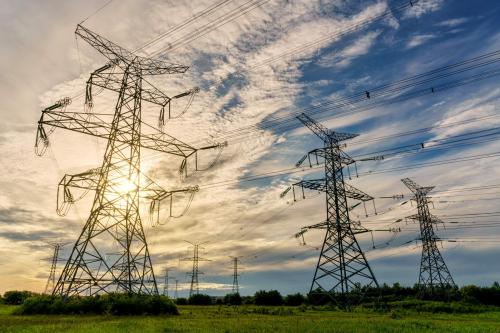NEAL CONAN, host:
This is TALK OF THE NATION. I’m Neal Conan in Washington.
But we begin with an update on Russia. Earlier today Russia and Ukraine resolved a heated dispute over the price of natural gas. On January 1st, Russia shut off supplies to Ukraine when the former Soviet republic refused to accept Russia’s demand for a four-fold increase in gas prices. Russia was forced to turn the tap back on when European customers complained that their prices, their supplies were also affected. A new five-year contract signed today should help avoid further disruptions in gas supplies in the near future, but Russia’s strong-arm tactics leave many wary of Russia’s role as a reliable source of energy and its role as the new leader of the G8, a position it assumed on January 1st.
CONAN: Well, let’s bring another voice into the conversation. This is Fiona Hill, a senior fellow at The Brookings Institution, where she specializes in Russia, Eurasia and energy issues. She’s with us from their studios here in Washington, DC.
Nice of you to join us today.
Ms. FIONA HILL (Senior Fellow, The Brookings Institution): Thanks, Neal.
CONAN: This is not the first time Russia has done this sort of thing, is it?
Ms. HILL: No, it certainly isn’t the first time. In fact, on various junctures over the last several years, Russia has employed these same kinds of strong-arm tactics, including with Ukraine, on issues of energy pricing and energy transit. And, in fact, one of the parties in the new deal, Turkmenistan, has experienced some real strong-arm pressure from Russia in the past. In 1997, for example, Gazprom, the Russian gas company that’s at the center of the recent dispute, cut off Turkmenistan’s access to the export pipelines that it used, in fact, to export gas to Ukraine and left Turkmenistan in a really dire situation for quite some time. It’s had a real an impact on the Turkmenistani economy. So there’s more than meets the eye to this deal here because Turkmenistan and its gas is a factor in this deal between Ukraine and Russia again.
CONAN: And it’s sort of interesting—a few years ago you would have expected that Gazprom by now would have been a privatized company. Instead it seems to be being used as an instrument of state power.
Ms. HILL: Well, I think that’s inevitable. Gazprom is not just the world’s largest gas company. It’s actually the world’s largest holder of gas. It holds single-handedly about 25 percent of world gas reserves. It’s very difficult to think of such an important entity being privatized. We’ve seen in Russia the tumults that the privatization of the oil sector caused, the great scandals over the last two years with, for example, Yukos and its head, Mikhail Khodorkovsky, who’s now, of course, sitting in a jail in Siberia.
And the Russians will, of course, point out that many important oil and gas producers from Norway to Saudi Arabia have their own state oil companies, and why should Russia not have a state-dominated gas company. The big question is more about the reform of Gazprom, and this is on the agenda also for this next year.
CONAN: Fiona Hill, does Russia still sell gas at subsidized prices to more favored former Soviet republics?
Ms. HILL: It certainly does. Belarus is the prime case in point. I think Belarus is purchasing its gas from Russia at around $47 per 1,000 cubic meter, which is just a little bit under what Ukraine was paying before; I think it was around $50 under the old contract that was at the heart of this dispute.
But even if you look at some of the other states, getting back to what Gregory has just said about Ukraine really coming out looking like a winner in this dispute, some of the other consumers of Russian gas are the former states of the Soviet Union, the Caucasus states–Armenia, Azerbaijan and Georgia. And even the Baltic states, which have been in numerous political disputes with Russia, are actually paying now more for their gas than Ukraine is. They’re paying between 110 and $120 for the same meter of gas, for the same 1,000 cubic meters.
So, in actual fact, Ukraine does appear to have come out quite well here. But it was inevitable that the price would be changed, I think, given the nature of the relationship between Ukraine and Russia at this point. The Russians have a good point about why should they continue to subsidize the gas. But in actual fact we now come out at the end with a question mark of who’s done better out of this deal. Frankly, I think, you know, if the Russians had handled this differently, they could probably have pushed Ukraine closer to the amount that the Caucasus states and the Baltic states are paying.
CONAN: And in Moscow, is Mr. Putin going to be looking like, well, he was in a confrontation with Mr. Yushchenko and he blinked?
Ms. HILL: Well, that’s exactly what it looks like. You know, in many respects, I think the Russians, as I said, were well within their rights to push for something closer to market prices. In fact, market prices are around the levels that they were first starting, the 220, $230 per 1,000 cubic meters that was the initial asking price, in which they claim that Gazprom is still selling its portion of the gas for. And this is something that the Russians are pushing very hard. They’ve made a strong statement about it. They’ve emphasized their importance as the primary gas supplier to Europe.
But what they’ve also done as a result is raise a lot of questions, not just about Russia’s reliability but whether Russia really sees oil and gas in particular as a commercial enterprise or whether it’s going to be purely a tool for political manipulation. And I think that’s the dangerous issue to put on the table right now for Russia, not just because of the G8 chairmanship but because there were also questions over the last year in many countries, like Germany, which is Europe’s largest gas consumer, about whether it was a good idea to be buying so much gas from Russia in the future. And I think this will make people ask that question even louder.
CONAN: And the theory that if Ukraine irritated Russia today and got this reaction, what if Germany did it tomorrow?
Ms. HILL: Sure, or somewhere a long time down the line. But, yes, I think many people in Brussels will be sitting wondering if that, indeed, could be the case somewhere on the horizon.
CONAN: And does it tell us also something about Russia today?—I mean, the explosion not only of gas and oil prices but the proportion of Russia’s industry that—or Russia’s exports that compromises. This is an OPEC nation almost.
Ms. HILL: Well, it’s a real vulnerability for Russia, just as you’re pointing out here. The Russian economy is incredibly tied up with oil and gas revenues. Cheap gas within Russia subsidizes its manufacturing industry. And Russia today is much more vulnerable to oil shocks, you know, that—a drop in the price of oil and gas than at any other point since the Soviet period.
So for Russia, it’s certainly a double-edged sword. On the one hand, oil and gas are its major strategic assets. You can’t blame the Kremlin for thinking that they can use these for influence. At the other hand, they’re also a great source of vulnerability, as many Russian economists and Russian political commentators have pointed out.
CONAN: Fiona Hill, thanks very much for being with us today.
Ms. HILL: Thank you, Neal.
CONAN: Fiona Hill, senior fellow at The Brookings Institution, joined us from the studios at The Brookings Institution; that’s down Massachusetts Avenue here in Washington, DC.



Commentary
Worries Over Russia as Fuel Supplier
January 4, 2006